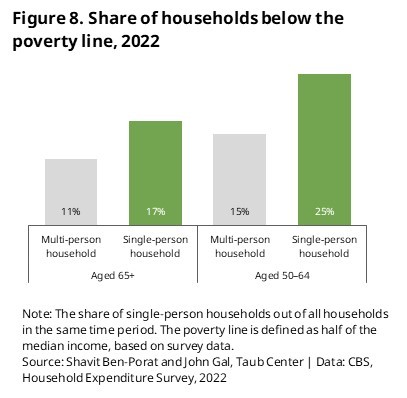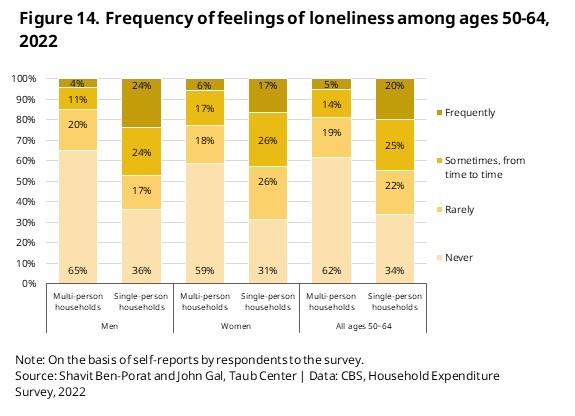The full research is currently available only in Hebrew.
A first-of-its-kind study in Israel, published by the Taub Center, reveals that there are currently about 144,000 men and women aged 50–64 living in single-person households, many of whom lack the resources, family, or institutional support needed to cope with the material, physical, and emotional hardships that undermine their quality of life.
The study’s authors, Shavit Ben-Porat and Prof. John Gal, note that this population is expected to grow significantly over the next two decades. They call on the welfare system to recognize it as a distinct group requiring targeted interventions and specific welfare programs — just as young people, families with children, and older adults receive.
The phenomenon of single-person households in Israel is expanding, especially among Jewish men
The findings show that by 2040, the total number of individuals aged 50–64 living in single-person households is expected to grow to about 199,000–207,000. The number of Jewish men — the largest group within this population — is expected to increase from about 69,200 today to 113,500–129,700. In Arab society, the share of those living alone is very low: about 2% of men and 5% of women, most of whom live alone following divorce or the death of a spouse.
Middle-aged single-person households are poorer than non-single-person households
The study shows that about 17% of single-person households live below the poverty line, compared with only about 11% of non-single-person households. In terms of employment and economics, single-person households are less likely to be employed and more reliant on allowances for their livelihood. Their difficulties are also noted in housing and health: a lower share live in homes they own, and among renters, more live in public housing. In addition, many forgo medical treatments and medications due to financial difficulties.

The study’s findings also show substantial social and emotional gaps. For example, feelings of loneliness are very common among individuals aged 50–64 in single-person households (about 20% report frequent loneliness, compared with about 5% among those in non-single-person households), and they report lower levels of overall life satisfaction. Multivariate analyses show that employment, household income, and number of children are associated with better social well-being among those aged 50–64, while disabilities exacerbate difficulties. The study highlights in particular the role of volunteering: individuals in single-person households who participate in volunteer activities feel less lonely and more satisfied with their lives — a finding that also emerged in international comparisons. At the same time, the data show that among single-person households aged 50–64, the share of volunteers is lower and the share of those suffering from severe disabilities is higher than among their peers in non-single-person households.

The researchers emphasize that while the welfare system recognizes the many needs of single-person households aged 50–64, in the absence of specific policies and dedicated welfare programs, social workers in local welfare departments struggle to provide them with comprehensive and tailored care. In light of this, the researchers propose several steps and policy options that could be adopted to address the needs of single-person households in midlife who suffer from personal and social hardships. These include, among others: appointing a coordinating body to oversee services for this population; providing specialized training for social workers to work with people living alone; and promoting the integration of single-person households into volunteer activities and the labor market.
Shavit Ben-Porat, one of the study’s authors, says: “The findings reinforce the understanding that the challenges facing single-person households in midlife are multidimensional and require tailored responses on the economic, social, and health levels. In addition, dedicated programs in housing, employment, and volunteering could significantly improve their quality of life.”
Prof. John Gal, another of the study’s authors, adds: “We sought to draw attention to a population group that suffers from social isolation and a lack of support networks. It is growing rapidly but is not receiving adequate attention from the welfare system. In view of the data presented in the study, it is essential for state institutions to develop comprehensive and long-term national policies to ensure that those who live alone are not neglected and that their needs and hardships are properly addressed.”
The Taub Center for Social Policy Studies in Israel is an independent, non-partisan socioeconomic research institute. The Center provides decision makers and the public with research and findings on some of the most critical issues facing Israel in the areas of education, health, welfare, labor markets and economic policy in order to impact the decision-making process in Israel and to advance the well-being of all Israelis.
For further details or to arrange an interview, please contact Chen Mashiach, the Center Spokesperson: 054-7602151.
